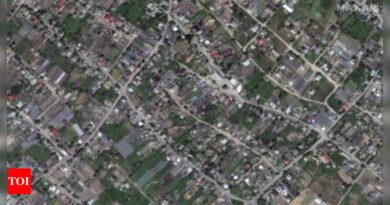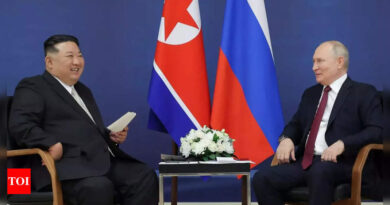Israeli ministry, in a ‘concept paper,’ proposes transferring Gaza civilians to Egypt’s Sinai – Times of India
NEW DELHI: The Israeli intelligence ministry has drafted a proposal suggesting the transfer of the Gaza Strip’s 2.3 million inhabitants to Egypt’s Sinai peninsula. This has led to heightened tensions with Egypt and strong condemnation from the Palestinians. While Prime Minister Benjamin Netanyahu’s office has downplayed the report, describing it as a “concept paper” and a hypothetical exercise, the proposal has reignited concerns in Egypt about Israel’s intentions towards Gaza and evoked painful memories for Palestinians of their displacement during Israel’s creation in 1948.
In its report, dated October 13, the intelligence ministry offered three alternatives “to effect a significant change in the civilian reality in the Gaza Strip in light of the Hamas crimesthat led to the Sword of Iron war.” The most favored option suggests relocating Gaza’s civilian population to tent cities in northern Sinai, followed by the construction of permanent cities and a humanitarian corridor.A security zone would also be established inside Israel to prevent the displaced Palestinians from returning. The paper does not specify the fate of Gaza after its population is relocated.
“We are against transfer to any place, in any form, and we consider it a red line that we will not allow to be crossed,” Nabil Abu Rudeineh, spokesman for Palestinian President Mahmoud Abbas, said of the report. “What happened in 1948 will not be allowed to happen again.”
A mass displacement, Abu Rudeineh said, would be “tantamount to declaring a new war.”
Egypt has historically been wary of Israel’s intentions, fearing a permanent expulsion of Palestinians into its territory. Egypt’s President, Abdel Fattah El-Sissi, has expressed concerns that such a move would undermine the Palestinian nationalist cause and could introduce militants into Sinai, posing security threats to both Egypt and Israel.
The document also hints at the possibility of other countries, including Turkey, Qatar, Saudi Arabia, the United Arab Emirates, and even Canada, supporting the plan either financially or by accepting the displaced Gazans as refugees, the report said.
The proposal acknowledges potential complications regarding international legitimacy but argues that evacuating the population could reduce civilian casualties in potential future conflicts.
Despite the Israeli government’s attempts to downplay the significance of the document, reports suggest that Netanyahu has been trying to persuade European leaders to pressure Egypt into accepting refugees from Gaza.
Meanwhile, Prime Minister Benjamin Netanyahu has firmly said that there would be no ceasefire in the conflict with Hamas. The UN expressed concerns about the inadequate aid reaching the area, given the “unprecedented humanitarian needs.”
The escalating military actions have raised significant concerns for Gaza’s 2.4 million residents. The health ministry, under Hamas’s administration, reported over 8,300 fatalities.
During a press briefing, Netanyahu emphasized that agreeing to a ceasefire would be equivalent to capitulating to Hamas. Netanyahu said, “Calls for a ceasefire are calls for Israel to surrender to Hamas, to surrender to terrorism… this will not happen.” He pledged that Israel would continue its efforts until they achieve victory.
The United States, an ally of Israel, also expressed its opposition to a ceasefire. National Security Council spokesman John Kirby said, “We do not believe that a ceasefire is the right answer right now,” suggesting that temporary “pauses” to allow aid into Gaza might be a more viable option.
(With inputs from agencies)
In its report, dated October 13, the intelligence ministry offered three alternatives “to effect a significant change in the civilian reality in the Gaza Strip in light of the Hamas crimesthat led to the Sword of Iron war.” The most favored option suggests relocating Gaza’s civilian population to tent cities in northern Sinai, followed by the construction of permanent cities and a humanitarian corridor.A security zone would also be established inside Israel to prevent the displaced Palestinians from returning. The paper does not specify the fate of Gaza after its population is relocated.
“We are against transfer to any place, in any form, and we consider it a red line that we will not allow to be crossed,” Nabil Abu Rudeineh, spokesman for Palestinian President Mahmoud Abbas, said of the report. “What happened in 1948 will not be allowed to happen again.”
A mass displacement, Abu Rudeineh said, would be “tantamount to declaring a new war.”
Egypt has historically been wary of Israel’s intentions, fearing a permanent expulsion of Palestinians into its territory. Egypt’s President, Abdel Fattah El-Sissi, has expressed concerns that such a move would undermine the Palestinian nationalist cause and could introduce militants into Sinai, posing security threats to both Egypt and Israel.
The document also hints at the possibility of other countries, including Turkey, Qatar, Saudi Arabia, the United Arab Emirates, and even Canada, supporting the plan either financially or by accepting the displaced Gazans as refugees, the report said.
The proposal acknowledges potential complications regarding international legitimacy but argues that evacuating the population could reduce civilian casualties in potential future conflicts.
Despite the Israeli government’s attempts to downplay the significance of the document, reports suggest that Netanyahu has been trying to persuade European leaders to pressure Egypt into accepting refugees from Gaza.
Meanwhile, Prime Minister Benjamin Netanyahu has firmly said that there would be no ceasefire in the conflict with Hamas. The UN expressed concerns about the inadequate aid reaching the area, given the “unprecedented humanitarian needs.”
The escalating military actions have raised significant concerns for Gaza’s 2.4 million residents. The health ministry, under Hamas’s administration, reported over 8,300 fatalities.
During a press briefing, Netanyahu emphasized that agreeing to a ceasefire would be equivalent to capitulating to Hamas. Netanyahu said, “Calls for a ceasefire are calls for Israel to surrender to Hamas, to surrender to terrorism… this will not happen.” He pledged that Israel would continue its efforts until they achieve victory.
The United States, an ally of Israel, also expressed its opposition to a ceasefire. National Security Council spokesman John Kirby said, “We do not believe that a ceasefire is the right answer right now,” suggesting that temporary “pauses” to allow aid into Gaza might be a more viable option.
(With inputs from agencies)




